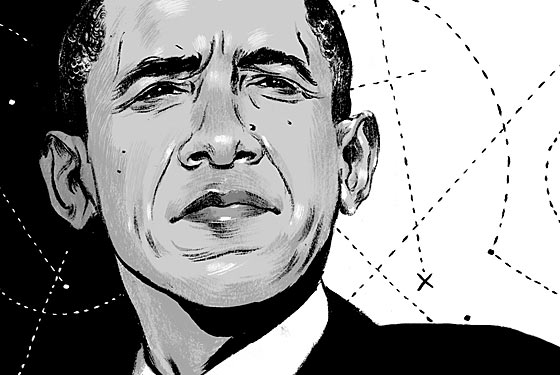
Barack Obama’s change of heart on going to war in Libya seemed decidedly out of character. Maureen Dowd went so far as to compare the president she once mocked as Spock—for his “Vulcan-like logic and detachment”—with another one of her stock characters, this one named W.: “Both men started wars of choice with a decision-making process marked more by impulse and reaction than discipline and rigor.” But that might even be unfair to Bush, considering he spent more than a year laying the groundwork for the invasion of Iraq; the lead-up to Operation Odyssey Dawn took days. As Secretary of Defense Bob Gates conceded, “We haven’t done something like this kind of on-the-fly before.”
But despite the perception that emotion drove the creation of the on-the-fly Libyan no-fly zone, there appears to be an undeniable rationale, if not an actual doctrine, underpinning Obama’s first war. Much of it comes courtesy of the female advisers who reportedly persuaded Obama to take action against Muammar Qaddafi—maybe none more so than Samantha Power. As a journalist and then an academic writing about genocide in the Balkans and Rwanda, Power was an articulate advocate for the concept of humanitarian intervention—a concept, she once lamented to Time, that had been “killed for a generation” by Bush’s invasion of Iraq. Now, as a senior aide on Obama’s National Security Council, Power has been working to rehabilitate humanitarian hawkishness. She’s apparently had some success. As Obama remarked in his Nobel Peace Prize speech in 2009: “I believe that force can be justified on humanitarian grounds, as it was in the Balkans, or in other places that have been scarred by war. Inaction tears at our conscience and can lead to more costly intervention later. That’s why all responsible nations must embrace the role that militaries with a clear mandate can play to keep the peace.”
With Libya, humanitarian hawks have found an almost too-good-to-be-true vehicle for this vision. In Qaddafi, the U.S. has an operatically villainous adversary who not only has the blood of Americans on his hands but also the blood of his own citizens, having pledged to Libyans who dare oppose him that his military “will find you in your closets.” From a purely Realpolitik perspective, Qaddafi also gives the U.S. a Muslim foe who—unlike even Saddam Hussein—is not particularly beloved by the Arab street, much less Arab leaders. Which explains why, unlike the war in Iraq, this military intervention is truly multilateral.
Then there’s the reality of this particular moment. There is no chance of the U.S. intervening militarily on behalf of the revolts in places like Bahrain or Yemen or Syria, where the U.S. either counts on the cooperation of its repressive leaders or fears the relative might of its armies. But Libya, with its isolated, intransigent dictator and ragtag military, presents no such difficulties. As such, it offers an ideal vehicle to signal to “those kids” (as an Obama aide, speaking to Politico, referred to Arab pro-democracy demonstrators) that the United States is on the right side of history.
Granted, there remain echoes of Iraq, the most worrisome being the apparent absence of an answer to the query then–Major General David Petraeus posed as his troops approached Baghdad in March 2003: “Tell me how this ends.” No one, least of all Obama, seems to know what comes next, whether or not Qaddafi remains in power. But the charge that Obama somehow dithered in making his decision on Libya or that, when he did decide, he reacted rashly, doesn’t quite hold up. After the Bush years, Obama’s foreign-policy project is, in part, to reposition the U.S. as protector rather than aggressor. As such, his goal in Libya was never, and never could have been, to use firepower to actively help the rebels oust Qaddafi. Rather, the goal of any American military involvement had to be to protect innocent civilians from being slaughtered. When it looked like that was about to happen, Obama acted. Spock hasn’t gone illogical on us after all.
Have good intel? Send tips to intel@nymag.com.